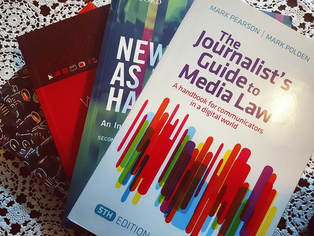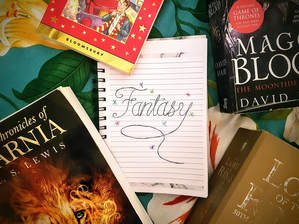|
21/9/2017 0 Comments Journalism 101 On the other side of my love for all things writing and reading is my passion towards journalism. If you have read the 'About' page, you would have noticed that I study journalism on top of professional writing, creative writing and linguistics. As a curious person, I enjoy asking questions to get to the facts of a situation, to learn more about a person or to make connections. As a journalist, I think it's important to have this urge to know more and to strive towards completely understanding situations to present them to the public with all the facts. This blog post will highlight the basics of journalism and maybe you'll find yourself inspired towards this profession, to tell the story of others and the world around you. Journalism can get a bad wrap from time-to-time. With trends such as 'fake news' being thrown around, it can be hard to trust what is reported or journalist's in general. Over the time I have studied the profession I have found that the best news is presented when it sticks to the basics. When they are flouted on the basis of acquiring viewers or readers, distrust grows and the respectability of the profession decreases. This blog is about storytelling, and if a story isn't written or told effectively, the main point is missed and chances are people aren't going to read or listen to the end. This is the same with journalism. The stories a journalist tells provides the public information and facts about situations that could be important to them, and, therefore, it is crucial that the basics are covered. So let me expand on what these are.
0 Comments
13/9/2017 1 Comment Genre: fantasy Fantasy is a genre many people will have encountered. Literature that involve fantasy provide a world away from our own, a world that is distinctly different and is unattainable in real life. They involve rules and laws unlike ours, and creatures that we wish to see but never will. They can either be completely new worlds, such as Urte in The Moontide Quartet by David Hair and Westeros in A Song of Ice and Fire by George R R Martin, or worlds that are connected to ours but are only available to some, such as Hogwarts in the Harry Potter series by J K Rowling. However, there is more to fantasy than this and the complexities of it make it one of the hardest genres to successfully produce. Why? Well, anyone can write a fantasy story. On the surface, it seems pretty easy. A writer can make up whatever they like and put it into a book and, boom, it's a fantasy... right? Yes and no. There are other genres out there that are similar to fantasy, such as science fiction and utopia/dystopia novels, so what the writer 'makes up' has to avoid delving into those. There is also the history that comes with any created world. When we're born isn't when the world begins. There is a history before us that we can learn. This is the same in fantasy. As human-beings we are inquisitive and curious, so if we are to read a book or watch a film that involves a world other than our own we will question the lore and reason behind it. What about the languages? The religions? There are many layers to a fantasy, and this is where the complexities lie. |
AuthorCharlotte is a reading and writing lover who has completed a creative writing intensive course at the University of Oxford and is a current university student studying a double degree in journalism and creative writing. If you are curious to learn more, check out the 'About' page. Archives
January 2019
Categories |
 RSS Feed
RSS Feed